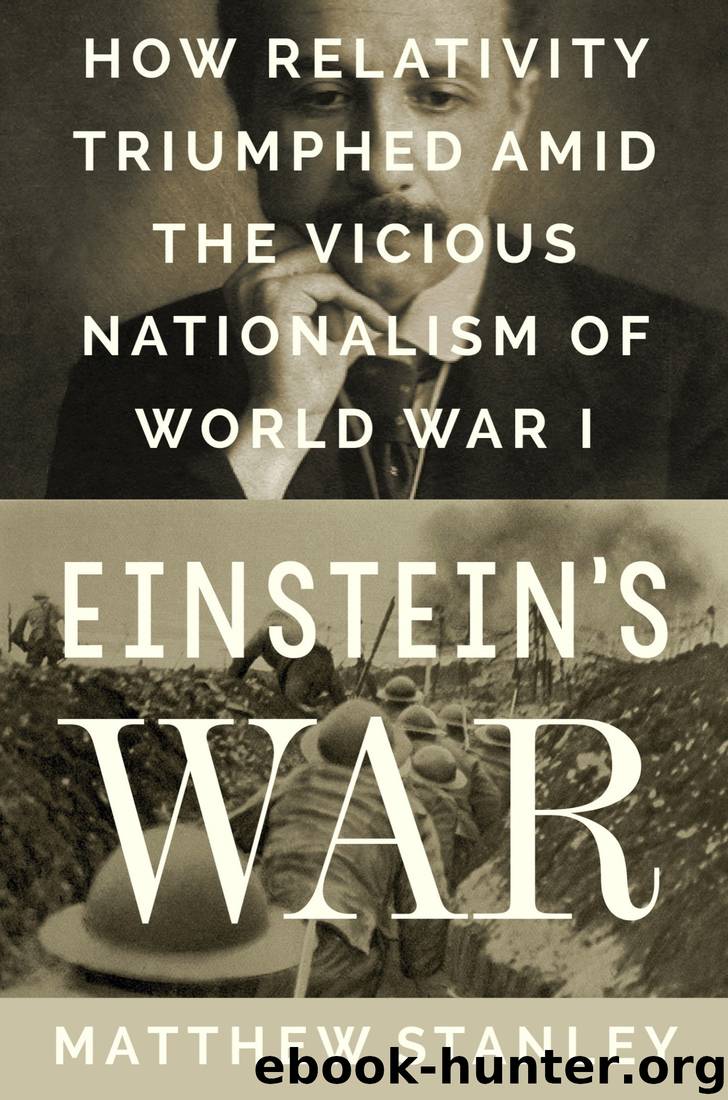Einstein's War: How Relativity Triumphed Amid the Vicious Nationalism of World War I by Matthew Stanley

Author:Matthew Stanley
Language: eng
Format: epub
Publisher: Penguin Publishing Group
Published: 2019-05-21T00:00:00+00:00
How star images in the Hyades are deflected from their positions by the sun’s gravity. Detail from the Illustrated London News, November 22, 1919.
COURTESY OF THE AUTHOR
The path of the eclipse was not particularly convenient, stretching over Africa and South America. No one knew if the war would be over by 1919 and Dyson was unsure whether the JPEC would be able to mount such an expensive, complicated expedition. Eddington thought the difficulty of such a project was actually a good thing. He had been trying to convince his colleagues of the necessity of truly international science, and this expedition could be the perfect example. A German theory, British astronomers, travel across three continents—exactly the sort of international cooperation that Eddington had been saying was essential to the very spirit of science. Even better, it was an opportunity to bring a pacifist, brilliant “enemy” scientist to the world’s attention. This expedition would not just be a scientific test, it would be a scientific demonstration—of international science as Eddington saw it. The stakes were high. In March 1917, even before he fully understood relativity, Eddington convinced Dyson to make a brief statement of support for sending an expedition in 1919. Everything was still uncertain, but it was the first step.
Even the Astronomer Royal couldn’t make this happen on his own, though. Eddington knew he needed to persuade the British scientific community that relativity was important and interesting enough to spend scarce resources on. He was an apostle bringing good news to a strange land. What he needed was some scripture—a fundamental text that he could point to and say, “This is what relativity means.” And, of course, it had to be in English. Einstein wasn’t likely to write it, so that meant Eddington had to do it himself. Once he felt he had a genuine command of the theory, he sat down to begin writing.
As is often the case when trying to convert a land to a new belief system, the locals in Britain already had their own deity: Newton. Most scientists were perfectly happy with the Newtonian system and did not appreciate Eddington’s missionary efforts. Chief among those was Sir Oliver Lodge, a walking, talking embodiment of the science of the Victorian age. He was an expert in electricity and magnetism at the University of Birmingham, developing many of the technologies that would eventually become radio (his patent dispute with Guglielmo Marconi over wireless telegraphy lasted for decades). He was also one of the great science writers of the time, with a few dozen books to his name. For a generation his name was synonymous with physics. He was famous enough to be caricatured in Vanity Fair. The drawing captured his lanky frame and the way his face-enveloping beard was balanced by an impressively smooth crown.
Lodge’s science was completely intertwined with the ether. He saw radio as the ultimate evidence for the ether’s reality. Maxwell had predicted that if there was ether, there would be electromagnetic waves. Hertz found those waves, and now Lodge was using them to talk across the sea.
Download
This site does not store any files on its server. We only index and link to content provided by other sites. Please contact the content providers to delete copyright contents if any and email us, we'll remove relevant links or contents immediately.
Enlightenment Now: The Case for Reason, Science, Humanism, and Progress by Steven Pinker(7311)
A Journey Through Charms and Defence Against the Dark Arts (Harry Potter: A Journey Through…) by Pottermore Publishing(4811)
The Immortal Life of Henrietta Lacks by Rebecca Skloot(4587)
A Journey Through Divination and Astronomy by Publishing Pottermore(4385)
Elon Musk by Ashlee Vance(4127)
Origin Story: A Big History of Everything by David Christian(3692)
COSMOS by Carl Sagan(3623)
Alchemy and Alchemists by C. J. S. Thompson(3520)
Bad Pharma by Ben Goldacre(3427)
Enlightenment Now by Steven Pinker(3368)
Shadow of Night by Deborah Harkness(3367)
Inferior by Angela Saini(3313)
A Mind For Numbers: How to Excel at Math and Science (Even If You Flunked Algebra) by Barbara Oakley(3306)
Origin Story by David Christian(3201)
The Code Book by Simon Singh(3189)
Signature in the Cell: DNA and the Evidence for Intelligent Design by Stephen C. Meyer(3138)
The Elements by Theodore Gray(3057)
A Brief History of Time by Stephen Hawking(3024)
A Journey Through Potions and Herbology (A Journey Through…) by Pottermore Publishing(2852)
